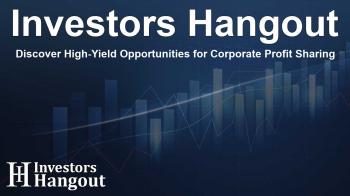Discover High-Yield Opportunities for Corporate Profit Sharing

High Profits and Low Dividends: A Surprising Trend
It's widely recognized that many corporations are generating significant profits, even amid economic uncertainties. However, when it comes to redistributing those earnings to shareholders through dividends, many companies fall short, with typical S&P 500 stocks yielding just over 1%. It's time to shift our focus and leverage high-yield closed-end funds (CEFs) to access a share of these corporate earnings.
Let’s look at two specific CEFs, which yield an impressive average of 9.7%. This means that an investment of $10,000 can translate to $81 each month, culminating in an annual income of $97,000 for a $1 million investment in these two funds.
To put it in perspective, many Americans have a vague sense of corporate profitability. If we took a closer look, we'd find a wide spectrum. For instance, major players like Walmart and Alphabet are emblematic of this dynamic.
Examining Profit Margins
Over recent years, Walmart has maintained a solid operating profit margin of 4.2%. In contrast, Alphabet boasts a remarkable 28.7%. While there are numerous companies positioned between these two examples, the average operating margin for S&P 500 firms sits close to 13%.
There's more to note; profits have been accelerating at an impressive rate, showing an increase of around 11% as seen in recent earnings reports. Most analysts anticipate this growth trajectory to continue throughout the year.
Understanding Dividend Patterns
A common observation exists where an uptick in corporate profits correlates with lower dividend payouts. For instance, Alphabet's yield stands at a meager 0.4%. Other top performers like Apple and Meta also showcase yields under 1%. This pattern leaves many investors looking for alternatives to gain from these profits.
Fortunately, CEFs provide a solution. By investing in these funds, individuals can lend to these corporations, which often have substantial debts. Take Amazon, which carries approximately $348.4 billion in debt, offering consistent interest payments as long as it remains healthy.
Exploring Yield Options
Currently, the average yield for high-yield corporate bonds is around 6.7%, a decrease from over 8% earlier in the year. Much like CEFs, the actual yields can vary since some acquire bonds at discounts, elevating potential returns.
If you're considering exposure to corporate bond markets, there exist index funds like the SPDR Bloomberg High Yield Bond ETF, which yields approximately 6.6%. However, our focus will rather be on CEFs, as they typically outperform simple ETFs. This superiority stems from personalized management that can navigate the bond market efficiently.
Analyzing High-Yield CEFs
Take note of the 10.8% yielding DoubleLine Income Solutions Fund (NYSE:DSL). This fund has consistently outperformed ETFs like JNK over the past decade and shows remarkable resilience in challenging market conditions.
The Resilience of DSL
Despite experiencing dips during market downturns, every decline in DSL's performance has presented a prime opportunity for investors. Considering the current market scenario, DSL remains highly attractive to buy for long-term gains.
Considering the Western Asset Fund
Another appealing option is the Western Asset Inflation-Linked Opportunities & Income Fund (NYSE:WIW), offering an 8.5% yield alongside unique inflation-linked securities. These bond types are resistant to value declines during inflationary periods, setting them apart from standard corporate bonds.
WIW’s Growth Perspective
Despite not outperforming DSL over the last decade, WIW's recent trajectory positions it well against JNK, suggesting a continued upward trend. Notably, while WIW currently trades at a 9% discount to its market value, such discounts often indicate potential for greater returns down the line.
CEFs, particularly those like DSL and WIW, are uniquely qualified for income-focused investors seeking to claim their share of substantial corporate profits, especially in an era characterized by low dividends from major companies. So, for those looking for passive income opportunities in the high-yield sector, these funds merit closer attention.
Frequently Asked Questions
What are high-yield closed-end funds (CEFs)?
High-yield closed-end funds (CEFs) are investment vehicles that grant investors access to high yields typically associated with corporate debt and bonds, allowing for regular income streams.
How do CEFs differ from ETFs?
CEFs are actively managed investment funds that often outperform ETFs due to their unique strategies and connections in the bond market, whereas ETFs are passively managed index funds.
What is the importance of profit margins in choosing investments?
Profit margins indicate how efficiently a company is operating and can help investors assess potential risks and opportunities within their investment choices.
How do inflation-linked bonds perform during economic changes?
Inflation-linked bonds are designed to increase in value with inflation, making them more resilient compared to traditional corporate bonds during inflationary periods.
Why should I consider funds like DSL and WIW?
Funds like DSL and WIW provide solid high-yield returns and strategic advantages, making them suitable options for income-focused investors seeking to benefit from corporate profits.
About The Author
Contact Ryan Hughes privately here. Or send an email with ATTN: Ryan Hughes as the subject to contact@investorshangout.com.
About Investors Hangout
Investors Hangout is a leading online stock forum for financial discussion and learning, offering a wide range of free tools and resources. It draws in traders of all levels, who exchange market knowledge, investigate trading tactics, and keep an eye on industry developments in real time. Featuring financial articles, stock message boards, quotes, charts, company profiles, and live news updates. Through cooperative learning and a wealth of informational resources, it helps users from novices creating their first portfolios to experts honing their techniques. Join Investors Hangout today: https://investorshangout.com/
The content of this article is based on factual, publicly available information and does not represent legal, financial, or investment advice. Investors Hangout does not offer financial advice, and the author is not a licensed financial advisor. Consult a qualified advisor before making any financial or investment decisions based on this article. This article should not be considered advice to purchase, sell, or hold any securities or other investments. If any of the material provided here is inaccurate, please contact us for corrections.

